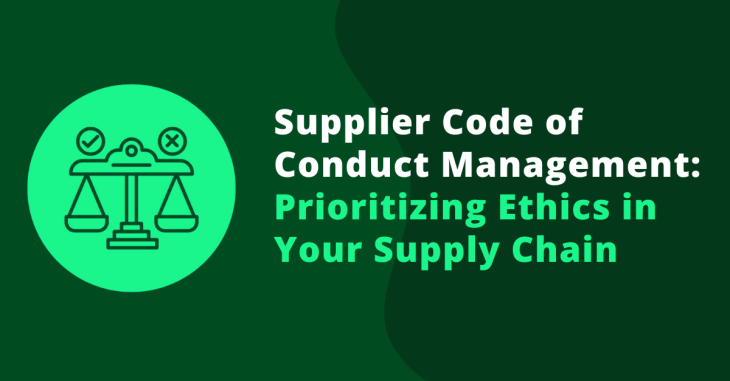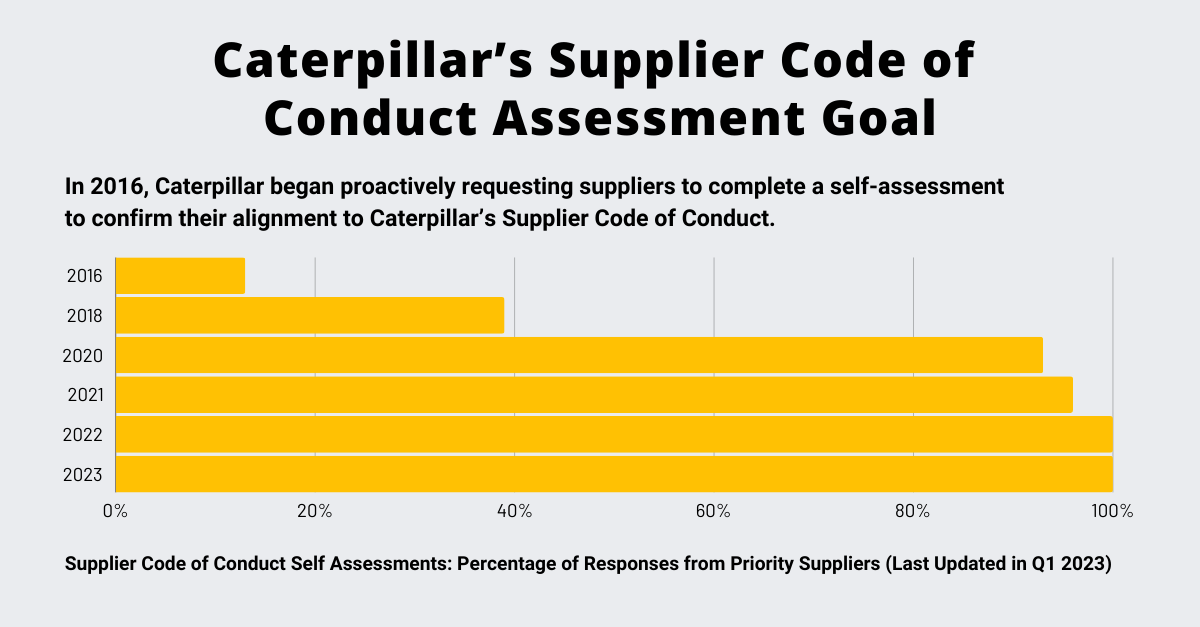Supplier Code of Conduct Management: Prioritizing Ethics in Your Supply Chain

A Tale as Old as Time: A Company Under Fire
News breaks out that a Tier 1 supplier in a company’s supply chain has been exploiting workers, using child labor, paying meager wages, and subjecting them to harsh working conditions.
The scandal ricochets across every media platform you can think of, and eventually catches the attention of influential stakeholders, including organized labor unions, advocacy groups, even celebrities share the news with millions of Instagram followers.
And there you have it, a once profitable business with global brand recognition and a loyal customer base comes crashing down like a house of cards – OVERNIGHT – its reputation shattered, market value plummeted, and legal repercussions looming large.
This is a cautionary tale about neglect. And how neglecting the importance of an ethical supply chain not only damages a company’s bottom line but also wreaks havoc on its long-term sustainability. In this blog, we’ll talk about how to mitigate this risk, but first let’s define what a supplier code of conduct is.

What is a Supplier Code of Conduct?
- A supplier code of conduct is a set of guidelines and standards that a company establishes for its suppliers, outlining its expectations and requirements for upholding ethical business practices
- It serves as a framework to ensure that suppliers adhere to ethical, social, and environmental responsibilities when conducting business activities
- The code typically covers labor rights, human rights, anti-corruption, environmental preservation and sustainability, product safety, and fair competition
- The purpose of a supplier code of conduct is to promote transparency, responsible practices, and a positive impact on society and the environment throughout the supply chain
- It is designed to protect the company’s reputation, mitigate risks, and build trust with customers, stakeholders, and communities
- Companies often require their suppliers to acknowledge and comply with the code of conduct as a condition of doing business with them
- The code may include provisions for monitoring and auditing suppliers’ compliance, as well as consequences for non-compliance
Why it’s Important to Manage Your Supplier Code of Conduct
Effectively managing a Supplier Code of Conduct is crucial for several reasons. First, it establishes a clear set of expectations and ethical standards that suppliers must adhere to when conducting business with your organization. This is essential for ensuring that suppliers align with your values and commitments, promoting fair and ethical practices throughout the supply chain. Secondly, a well-managed Supplier Code of Conduct helps mitigate various risks, including reputational damage, legal issues, and supply chain disruptions. By proactively managing your Supplier Code of Conduct, you can ensure ethical sourcing, protect your brand, mitigate risks, promote responsible supply chain management, and foster stronger relationships with stakeholders.
How World-Class Companies Use Digital Innovation to Manage their Code of Conduct
World-class companies integrate digital technology to revolutionize and streamline their code of conduct processes – fostering accuracy, efficiency, and collaboration with suppliers. These companies integrate advanced algorithms, artificial intelligence, and cloud-based platforms to automate the monitoring and enforcement of their code of conduct, using real-time data analytics to identify potential compliance issues and proactively address them.
Digital platforms facilitate seamless communication and collaboration with suppliers through secure, cloud-based systems. These systems enable transparent sharing of information, documentation, and updates on ethical guidelines, ensuring that suppliers are well-informed and aligned with the company’s values. In this interconnected digital ecosystem, smart contracts and blockchain technology provide a tamper-proof and traceable record of transactions, reinforcing the integrity of the supply chain.
Machine learning algorithms are employed to analyze vast datasets, identifying patterns and trends that may indicate areas of potential ethical concern. This predictive capability enables companies to stay ahead of compliance challenges, implementing preventative measures, and continuously refining their code of conduct. Through intuitive user interfaces and mobile applications, suppliers are empowered to actively participate in the compliance process, reporting incidents or seeing clarification on ethical standards.
World-class companies leverage digital platforms to conduct regular, comprehensive audits, employing data analytics to assess supplier performance against established ethical benchmarks. This approach not only ensures compliance but also promotes a culture of continuous improvement, fostering long-term partnerships with suppliers who share with the company’s commitment to ethical business practices.
The synergy of cutting-edge digital technologies and a forward-thinking approach positions the tech company as a trailblazer in ethical governance, setting new standards for accuracy, efficiency, and collaboration within the supply chain. The integration of powerful digital tools not only enhances the company’s code of conduct process but also reinforces its reputation as a socially responsible and technogically innovative industry leader.
Best in Class Examples
There is an endless list of reasons why organizations are now embracing the concept of a supplier code of conduct. And while a quick google search can render reams of cautionary tales, there are also companies that have integrated codes that are worthy of imitation.
A few of our favorite examples include:
Caterpillar – in 2016, Caterpillar began proactively requesting suppliers to complete a self-assessment to confirm their alignment to Caterpillar’s Supplier Code of Conduct. Going from a dismal 13% in 2016 to a righteous 100% in 2023. It takes courage to publicly disclose numbers and figures that paint an unflattering start. However, comparing where they started to where they are today, it’s an inspiring example for any company to see.

Steelcase – This company that is widely regarded as a best-in-class example for several reasons. Steelcase’s Supplier Code of Conduct actively seeks suppliers who share their commitment to promoting fair labor practices, respecting human rights, and ensuring safe and healthy working conditions. Their Supplier Code of Conduct is well-defined, and sets clear/comprehensive expectations and standards for suppliers to adhere to. Additionally, Steelcase actively monitors and audits their suppliers to ensure compliance. They employ third-party audits and assessments to verify supplier activities. In addition, Steelcase provides training and support to suppliers to help them improve their sustainability performance. They believe in open communication and collaboration, recognizing the importance of building long-term partnerships based on mutual trust and respect.

The Role of the Board, Investors, and Supply Chain Leaders
The board of directors plays a vital role in managing a supplier code of conduct within an organization. They are responsible for establishing the policies and guidelines that suppliers must adhere to, ensuring ethical and responsible practices in the supply chain. The board sets the overall strategic direction of the company and works with management to develop and enforce the supplier code of conduct. They also monitor and evaluate supplier performance against the code, taking appropriate action if any violations are identified. The board’s ultimate responsibility is to ensure that the organization upholds the highest standards of ethics and compliance throughout its supply chain.
Investors also play an important role in managing a supplier code of conduct. They have the power to influence an organization’s behavior by making investment decisions based on environmental, social, and governance (ESG) factors. Investors can engage with companies they invest in to encourage the adoption and enforcement of robust supplier codes of conduct. They can also use their influence to promote transparency and accountability by requesting regular reporting on supplier performance. The alignment of investor expectations with the company’s supplier code of conduct can help drive positive change and reduce risks.
If managing a supplier code of conduct is part of your job responsibility, there are several things you should be aware of. Firstly, you should familiarize yourself with relevant industry standards and guidelines, such as the United Nations Global Compact or industry-specific codes of conduct. Secondly, it is important to effectively communicate the supplier code of conduct to all stakeholders, including suppliers, employees, and investors. Clear expectations and regular training can help ensure compliance. Lastly, you should establish mechanisms for monitoring supplier performance, such as conducting audits or implementing supplier self-assessment questionnaires. By regularly assessing supplier adherence to the code, you can proactively address any potential risks or violations.
Clearing the Path for Technology and Innovation
Of course, if your company works with hundreds or thousands of suppliers, and you’re attempting to administrivia your way through that mountain of work, you’re in for a long hard slog. Puzzling together color-coded spreadsheets and hitting the magnifying glass icon a hundred times a day, feverishly searching through email chains will have you feeling like a modern-day Nancy Drew.
If this scenario is describes your present-day reality, you’re not alone. There are a lot of Nancy Drews out there. Doing the exact same thing – wasting a non-renewable resource – your precious time.

Here’s the truth: you can take what feels like an impossible task and automate the entire process. How great would it be if you could verify and audit your suppliers with a robust cloud-based platform that centralizes all your supplier data, reducing manual effort and potential errors?
Technology plays a pivotal role when streamlining how you manage your supplier code of conduct. Cloud-based platforms offer advanced analytics and real-time visibility into supplier activities.

Conclusion
Learn how Rhythm Innovations can help you optimize your supplier capability function.
Rhythm can help you create a seamless, customer-centric supply chain. We have a solution that fully automates supplier management functions.
CLICK to learn more.


